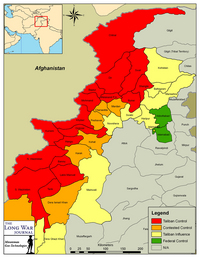Waziristan operation not on the horizon: Zardari
Sunday, June 7, 2009
The military has no plans to launch an operation against the Taliban in North and South Waziristan, Pakistan's president said, denying earlier reports.
President Asif Ali Zardari backtracked from statements made to The Times during his visit to the US.
"We�"re going to go into Waziristan, all these regions, with army operations," Zardari told The Times in an interview. "Swat is just the start. It�"s a larger war to fight."
Zardari told reporters in Islamabad that he was misquoted by The Times, according to a report in The India Tribune, but reiterated that the Pakistani Army would continue to fight the Taliban.
The Taliban responded to Zardari's threat by demanding that the military withdraw from outposts in Wana, Tanai, and Shakai, and vacate the brigade headquarters in Zari Noor. The Taliban also demanded the military stop establishing checkpoints along the roads, minimize military traffic, and end the Predator strikes targeting Taliban and al Qaeda leaders. The Taliban gave the military until May 25 to respond "or face consequences," according to Dawn.
The report of a planned invasion of Waziristan sparked panic along the local tribesmen. Thousands of people left their homes in regions of South Waziristan that are known to be strongholds of Pakistani Taliban leader Baitullah Mehsud.
More than 200,000 people are expected to flee the Waziristan region and join the more than 2.2 million internally displaced persons who have left their homes to avoid the fighting in Swat, Dir, Buner, and Shangla. The government has established two camps in the neighboring districts of Tank and Dera Ismail Khan.
Sporadic fighting has broken out in North and South Waziristan as the Taliban conducts attacks in the region. The military shelled suspected Taliban strongholds after a suicide bomber killed nine Pakistanis, including five Frontier Corps troops, in an attack on the Jandola Fort in Tank. No casualties were reported in the artillery barrages.
In North Waziristan, a military convoy was hit with a roadside bomb attack. No casualties were reported, but the military halted traffic on the road from Miramshah to Bannu.
Waziristan operation would pit Army against the Taliban's best fighters
The Pakistani military has avoided targeting the Taliban in North and South Waziristan after suffering a string of humiliating defeats there between 2004 and 2008. The most recent operations in Waziristan resulted in peace agreements that have ceded control of the region to the Taliban.
The last time the Pakistani military took on the Taliban in North Waziristan was in October 2007. The Pakistani military and the Taliban fought pitched battles after the military launched artillery barrages and helicopter and attack aircraft assaults against Taliban-controlled villages in North Waziristan.
The Taliban responded by setting up complex ambushes, including surface-to-air missile traps, a senior US military intelligence official told The Long War Journal. Several Pakistani Army helicopters were said to have been shot down during the fighting. The Pakistani military claimed that 120 Taliban and 45 soldiers were killed in the fighting, but independent reports put the number of soldiers killed much higher.
At the end of October 2007, the government pushed for a peace deal and the fighting waned. The Taliban, led by the Haqqani Family and Hafiz Gul Bahadar, remained entrenched in the region. In February 2008, an official peace agreement was signed.
The last major operation against the Taliban in South Waziristan took place in late January 2008. The military launched an offensive with the declared aim of dislodging Baitullah Mehsud's forces from entrenched positions. Prior to the military�"s offensive, the Taliban overran two military forts and conducted numerous attacks against Pakistani forces. More than a dozen of Pakistan�"s elite counterterrorism commandos were killed in a single engagement.
The military claimed to eject the Taliban from strongholds in Kotkai and Jandola and said it killed Qari Hussain, a senior Taliban leader who trains suicide bombers. Hussain later mocked the government during a press conference in May 2008. Just 11 days after the fighting in South Waziristan had begun, the military sued for peace. The Taliban retook control of Jandola four months later, after murdering dozens from a rival tribe while the military looked on. The military has since abandoned several forts in South Waziristan and has kept activity there to a minimum.
Taliban forces belonging to Baitullah Mehsud, Mullah Nazir, Hafiz Gul Bahadar, and the Haqqanis have only grown stronger since defeating the Pakistani military during engagements in 2007 and 2008. Tens of thousands of fighters are under the collective command of the leaders. And a recent alliance between three of these commanders has unified the Waziristan Taliban.
Earlier this year, Baitullah, Nazir, and Bahadar put aside tribal differences and created the Council of United Mujahideen. The Taliban leaders "united according to the wishes of Mujahideen leaders like Mullah Muhammad Omar and Sheikh Osama bin Laden," according to a pamphlet released by the group announcing its formation. The new Taliban alliance said it openly supports Omar and bin Laden in their war against the US, Pakistan, and Afghanistan.
The four Taliban leaders openly support al Qaeda and host training camps for the terror groups as well as for the numerous Pakistani jihadi groups. The leaders provide fighters to serve in the Lashkar al Zil, al Qaeda�"s paramilitary organization that operates along the Afghan and Pakistani border areas.
Waziristan operation not on the horizon: Zardari
[Source: Good Times Society]
posted by tgazw @ 4:28 AM,
![]()
0 Comments:
Multimedia
Top Stories
Sponsored Links
Sponsored Links

Post a Comment